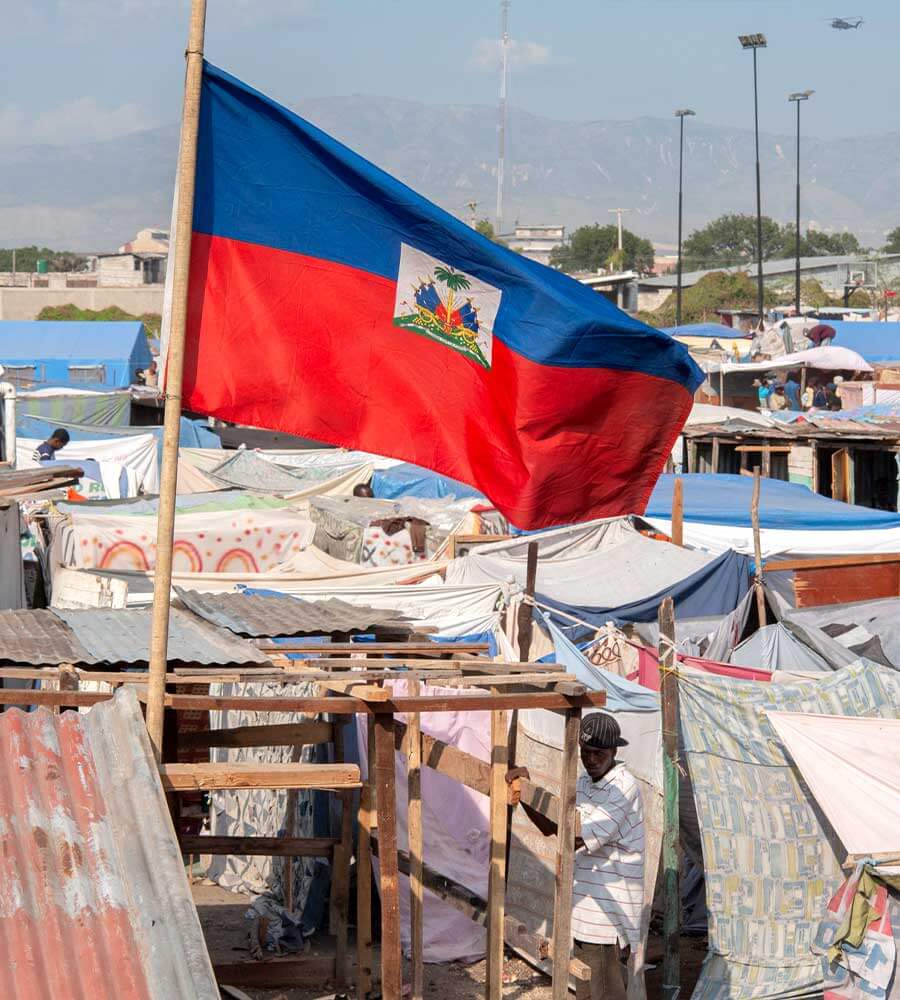Our work in Haiti
The future of Haiti must be shaped by Haitian hands
Haiti’s sociopolitical landscape remains turbulent as it confronts a catastrophe rooted in a history of foreign invasion, neo-colonialism, and exploitation.
Image: Haitian flag flies over refugee camp in Port-au-Prince

Haiti’s fight for a just future
Armed gangs have seized control of much of the country, terrorizing neighborhoods and disrupting daily life. Farmers can’t get goods to market, public services are failing, and violence against women and children is rampant.
Despite the ongoing dire situation, compounded year to year by natural disasters, the spirit of Haiti’s people remains strong with dreams and energy. Community leaders, many of them women, are mobilizing to secure the future they deserve. Haitians are demanding Haitian-led solutions. UUSC is ensuring that no one turns a blind eye to Haiti’s struggle as we support our partners’ powerful call for global solidarity and action.
The history
The story of Haiti begins not with crisis, but with one of the most revolutionary acts of liberation in human history. In 1804, Haiti became the first Black republic and the first independent nation in the Americas to be led by people formerly enslaved. With France imposing $20 billion of debt and the United States’ history of interference through military occupations, coups, and support for authoritarian dictators, the democratic institution of Haiti was weakened by centuries of exploitation.
In the wake of this history and the years since Haiti’s devastating 2010 earthquake, UUSC has deepened its respectful relationship with the country and its people. Haiti is not to be pitied or saved, but rather a sovereign nation whose struggle for self-determination offers lessons for liberation movements everywhere. Our immediate response to situations like this prioritizes the dignity of survivors and aligns with the community’s needs in determining how to distribute aid and advance recovery. During the COVID-19 pandemic in 2019, as international attention shifted and resources dried up, UUSC sustained its presence in Haiti by addressing issues of food insecurity, lack of healthcare access, and increased gender-based violence.
As of 2025, Haiti remains in a deep crisis. However, this could mark a potential turning point. The departure of U.S.-backed Prime Minister Ariel Henry and the formation of a transitional council offer some positive outlook towards the future. Even in the absence of a fully functional government and facingchaos in the streets, our trusted partners, grassroots and peasant movements, continue to work hard every day for the right to safety for Haitians. Whether by amplifying the narratives from independent media outlets,funding organizing, or facilitating training to strengthen food sovereignty, we believe the struggle for Haitian liberation is inseparable from broader movements for global justice.
Hope always overcomes oppression
We resource Haitian-led efforts to address immediate needs while building long-term justice. We proudly work with the diaspora in partnerships rooted in solidarity, not charity. As our ally Nixon Boumba reminded us during our 2024 Human Rights Day teach-in, “we are living in a moment of opportunity. An opportunity for change.”
Groups like the Mouvement Paysan de Papaye (MPP) are advancing climate resilience and women’s financial independence through peasant-led cooperatives and rural microloan programs. Meanwhile, GARR is providing legal aid and reintegration services to Haitian migrants who have been deported from the Dominican Republic. Other partners include the Haitian Bridge Alliance (challenging harmful narratives), the Haitian American Foundation for Democracy (advocating for national policy changes), and Solidarité Farm Ayisyen (combating gender-based violence).
Haiti’s story isn’t over, and we’re here to champion and support our partners’ visions of a brighter future.
Support community-led response
Your gift delivers vital resources directly to grassroots organizations leading the way through a crisis — providing care, protecting rights, and organizing for long-term change.